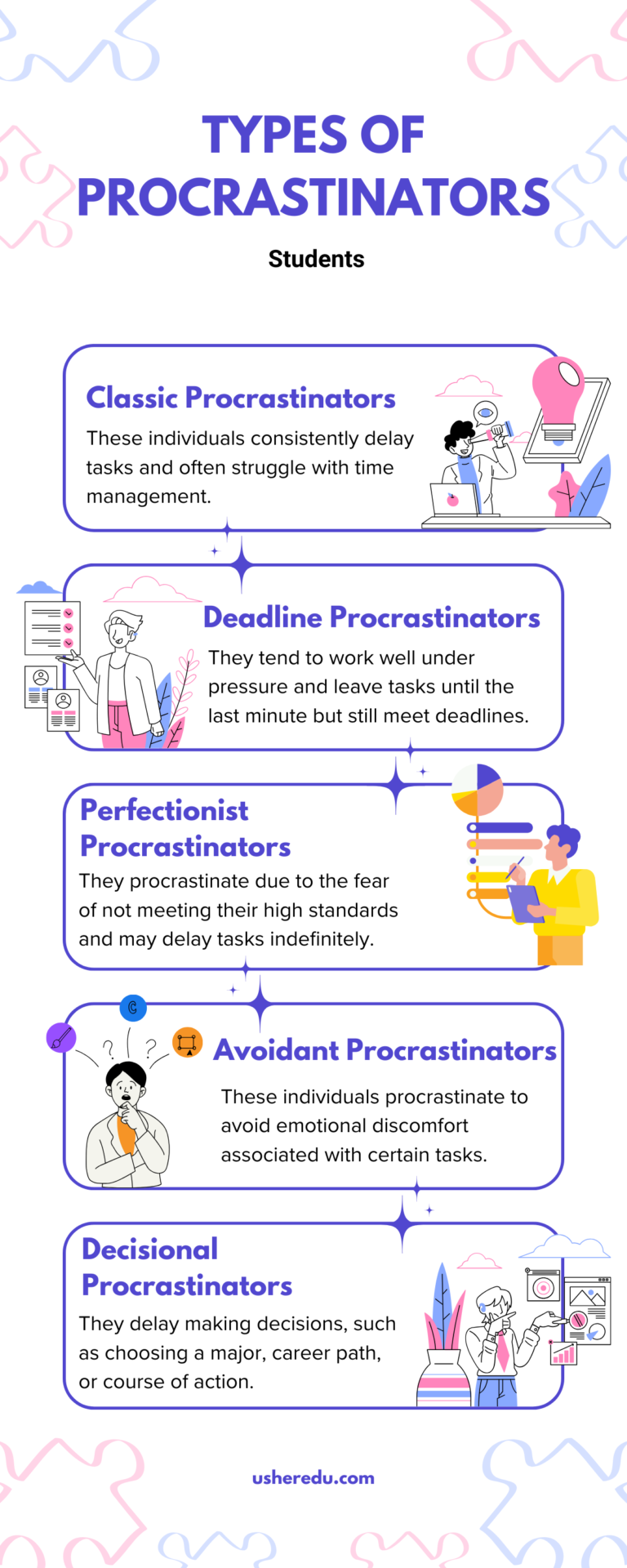Did you ever postpone your homework or any other work you were assigned?
Do you find it difficult and lazy to get started on your work?
Have you ever thought about why you feel that way?
This is the most basic and straightforward example of “Procrastination”
What is Procrastination?
Procrastination is the act of delaying or postponing tasks or activities that need to be accomplished, often leading to unnecessary stress and anxiety.
It is a common behavior that affects individuals in various aspects of their lives, including academics, work, and personal goals.
With regard to students, procrastination refers to the act of delaying or postponing academic tasks, assignments, or responsibilities that need to be completed within a specified timeframe.
It involves avoiding or putting off studying, homework, research, or any other educational obligations in favor of less important or more immediate activities, often leading to time management issues and academic stress.
So, why do we feel this way? Why does the human mind try to put off doing things until later?
The Science Behind Procrastination
Procrastination is a complex behavior that has been studied from various scientific perspectives, including psychology, neuroscience, and behavioral economics. While there is no single, definitive explanation for procrastination, researchers have proposed several theories and factors that contribute to this behavior:
Temporal Discounting
One key concept in the science of procrastination is temporal discounting. This refers to the tendency of individuals to place a higher value on immediate rewards and benefits while discounting the importance of future rewards. In the context of procrastination, students may delay studying or working on assignments because the immediate pleasure of engaging in other activities (e.g., socializing, watching TV) is more appealing than the delayed, future benefits of completing academic tasks.
Self-regulation and Self-control
Procrastination often involves difficulties in self-regulation and self-control. People who procrastinate may have trouble managing their impulses and delaying gratification. This can lead to a preference for short-term rewards over long-term goals, even when they are aware of the negative consequences.
Task Aversion
Sometimes, procrastination can be driven by task aversion or a dislike of the task at hand. When a task is perceived as boring, difficult, or anxiety-inducing, individuals may put it off to avoid the negative emotions associated with it.
Fear of Failure
The fear of failure can be a powerful motivator for procrastination. Students may delay working on assignments or studying because they are afraid of not meeting their own or others’ expectations. Procrastinating provides a temporary relief from this anxiety, even though it ultimately increases stress and decreases the likelihood of success.
Executive Function and Decision-Making
Executive function refers to a set of cognitive processes that help individuals plan, prioritize, organize, and make decisions. Weak executive function can contribute to procrastination because it impairs the ability to manage time and tasks effectively.
Perfectionism
Perfectionists may be more prone to procrastination because they set unrealistically high standards for themselves, leading to a fear of not meeting those standards. This fear can paralyze them and prevent them from starting tasks.
Psychological Factors
Procrastination can also be linked to various psychological factors, such as low self-esteem, depression, anxiety, and poor self-efficacy. These emotional states can make it difficult to initiate tasks and maintain focus.
Dopamine and Reward System
Some studies have suggested that procrastination may be associated with the brain’s dopamine reward system. When individuals complete tasks, their brains release dopamine, a neurotransmitter associated with pleasure and reward. Procrastinators may delay tasks to experience the pleasure of completing them later, even though this can lead to stress in the meantime.
It’s important to note that the science of procrastination is an ongoing field of research, and our understanding of its underlying mechanisms continues to evolve.
Why do Students procrastinate?
Students procrastinate for a variety of reasons, and their motivations for procrastination can differ based on individual characteristics, personal circumstances, and the nature of the tasks they need to complete. Here are some common reasons why students procrastinate:
Lack of Motivation
When students find a task uninteresting, irrelevant, or lacking in personal motivation, they are more likely to put it off in favor of more enjoyable activities.
Fear of Failure
Students may procrastinate because they fear they will not perform well or meet their own or others’ expectations. The anxiety associated with the possibility of failure can be paralyzing.
Poor Time Management
Inadequate time management skills can lead to procrastination. Students may not know how to prioritize tasks, set deadlines, or create effective schedules.
Task Difficulty
If a task is perceived as particularly challenging or complex, students may avoid it because they believe they lack the necessary skills or knowledge to complete it.
Perfectionism
Perfectionists tend to set extremely high standards for themselves, and the fear of not meeting those standards can lead to procrastination as they delay starting tasks until they feel more confident.
Lack of Self-discipline
Some students may struggle with self-regulation and impulse control. They may find it difficult to resist immediate gratification (e.g., social media, entertainment) in favor of long-term academic goals.
Overwhelming Workload
When students feel overwhelmed by the volume of tasks they need to complete, they may procrastinate due to a sense of helplessness or not knowing where to start.
Lack of Interest
Procrastination is more likely to occur when students have little interest in the subject matter or do not see the relevance of the task to their personal or academic goals.
Distractions
Students frequently encounter a wide range of distractions, such as smartphones, social media, and online entertainment, which can easily draw their focus away from academic duties.
Delayed Rewards
Some students may struggle with the concept of delayed gratification, preferring immediate rewards (e.g., leisure activities) over the long-term benefits of completing their academic work.
Lack of Accountability
When students do not have external accountability, such as strict deadlines or supervision, they may be more prone to procrastination.
Health and Well-being
Physical and mental health issues, including stress, anxiety, depression, and fatigue, can contribute to procrastination as students may lack the energy or motivation to work on their tasks.

Impact of Procrastination on Students
Procrastination can have a significant impact on students, affecting various aspects of their academic and personal lives. Some of the key impacts of procrastination on students include:
Reduced Academic Performance
Procrastination often leads to inadequate time for studying, completing assignments, or preparing for exams. As a result, students may earn lower grades or not achieve their full academic potential.
Increased Stress and Anxiety
Procrastination can create high levels of stress and anxiety, especially as deadlines approach. Students may experience panic, worry, and emotional distress when they realize they have limited time to complete their tasks.
Time Management Issues
Procrastinators tend to have poor time management skills, which can lead to a cycle of missed deadlines and rushed work. This lack of time management can hinder a student’s ability to juggle multiple responsibilities effectively.
Poor Quality of Work
When students procrastinate, they often rush through assignments and do not have sufficient time for revision or improvement. This can result in lower-quality work and missed learning opportunities.
Health Problems
The stress and anxiety associated with procrastination can lead to physical and mental health problems, such as insomnia, headaches, and even depression. Neglecting one’s health due to procrastination can have long-term consequences.
Decreased Motivation
Chronic procrastination can erode a student’s motivation and enthusiasm for learning. As they repeatedly delay tasks, they may start to question the value of their education and become demotivated.
Impaired Self-esteem
Procrastination can lead to feelings of guilt, self-blame, and reduced self-esteem. Students may view themselves as lazy or incapable, further diminishing their self-confidence.
Strained Relationships
Procrastination can strain relationships with peers, professors, and family members. Missed deadlines and poor time management may result in conflicts and strained interpersonal interactions.
Lost Opportunities
Procrastination can cause students to miss out on valuable opportunities, such as internships, research projects, or extracurricular activities, which can be important for personal and professional development.
Reduced Learning Efficiency
Procrastination may lead to inefficient learning. Instead of spacing out their studying over time, students cram at the last minute, which can hinder long-term retention and understanding of the material.
Financial Consequences
If students fail courses or do not perform well academically due to procrastination, it can result in increased educational costs, such as retaking classes or prolonging their time in school.
Future Career Implications
Academic performance can impact future career opportunities. Repeated procrastination and poor academic records may limit job prospects and advancement opportunities.
Decreased Self-Esteem
Repeatedly failing to meet your own goals and commitments due to procrastination can erode your self-esteem. This negative self-perception can lead to feelings of inadequacy and self-doubt, which can negatively impact your mental health.
Guilt and Shame
Procrastination often results in feelings of guilt and shame. When you know you should be doing something but keep avoiding it, these emotions can take a toll on your mental well-being.
How Students Can Beat Procrastination
Stopping procrastination can be challenging, but there are several strategies and techniques that students can use to overcome this habit and improve their productivity. Here are some effective ways for students to stop procrastinating:
Set Clear Goals
Clearly define your academic and personal goals. Having a strong sense of purpose and knowing why you need to complete a task can increase motivation and reduce procrastination.
Break Tasks into Smaller Steps
Large, daunting tasks can be overwhelming and lead to procrastination. Break them down into smaller, more manageable steps, making it easier to get started.
Prioritize Tasks
Use a to-do list or task management system to prioritize your assignments and responsibilities. Focus on the most important and time-sensitive tasks first.
Create a Schedule
Develop a daily or weekly schedule that allocates specific time blocks for studying, completing assignments, and other academic activities. Stick to this schedule as closely as possible. This would help you become a more productive student.
Set Specific Deadlines
In addition to the official deadlines, set your own interim deadlines for various stages of a project. This helps you stay on track and avoid last-minute rushes.
Use Time Management Techniques
Explore time management techniques like the Pomodoro Technique, time blocking, or the two-minute rule to help you stay focused and productive.
Eliminate Distractions
Identify common distractions in your study environment, such as your smartphone, social media, or noise, and take steps to minimize or eliminate them while working.
Find the Right Environment
Create a conducive study environment that is comfortable and free from distractions. A dedicated workspace can improve focus and productivity.
Practice Self-discipline
Develop self-discipline by setting clear boundaries on leisure activities and rewarding yourself for completing tasks. For example, use breaks or rewards as incentives.
Use Positive Self-talk
Replace negative thoughts and self-doubt with positive self-talk. Encourage yourself and focus on your progress rather than your shortcomings.
Overcome Perfectionism
Recognize that perfectionism can lead to procrastination. Accept that tasks don’t need to be perfect and that it’s okay to make mistakes or have imperfections.
Stay Accountable
Share your goals and progress with a friend, family member, or a study group. Being accountable to someone can motivate you to stick to your schedule.
Seek Support
If procrastination is a persistent issue, consider seeking support from a counselor, therapist, or a campus support service that can help you address underlying issues and develop coping strategies.
Use Technology Wisely
Utilize productivity apps and tools to help you stay on track. There are many apps that can assist with time management, task organization, and focus.
Practice Mindfulness and Stress Management
Techniques like deep breathing, exercise and meditation can help reduce stress and anxiety, making it easier to stay focused and avoid procrastination.
Learn from Past Mistakes
Reflect on past instances of procrastination and learn from them. Identify the triggers and challenges that led to procrastination and find ways to overcome them.
I personally feel that the book Stop Procrastinating is a valuable guide for anyone looking to improve their time management skills. It offers practical strategies and tips for overcoming procrastination and staying focused on tasks.
Remember, procrastination is a common struggle for many students and adults alike. Do not demotivate yourself if you have this habit.
All you need to do is seek help whenever necessary.
Don’t be afraid to ask for assistance or seek guidance from others when you find yourself struggling with procrastination.
Whether it’s reaching out to a mentor, joining a support group, or seeking professional help, recognizing when you need support can greatly aid in overcoming procrastination and staying focused on your goals.




